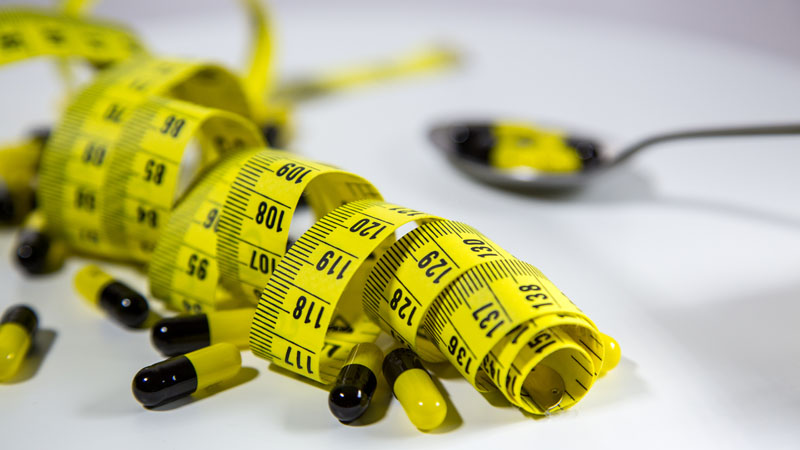About Diet Pills | Who Should Not Take Diet Pills | How do Diet Pills Work | How Diet Pills Affect Menstrual Cycle | Side Effects of Diet Pills | How Intermittent Fasting Can Help
Many women are conscious about their health, especially their bodies. They always quest for ways to lose body weight and look slim. For that, they often turn to several slimming methods, such as the keto diet, paleo diet, intermittent fasting, and sometimes popping slimming pills with the hope to achieve their weight loss goals. Let’s dive into a topic we get asked about a lot – Can Diet Pills Affect Your Period?
If you are someone who has been trying to get rid of bulging belly fat and has considered diet pills into your weight loss regimen for quick results, then you must know that diet pills may affect your periods.
What are Diet Pills, and How do They Work?
Diet pills are medications used as a substitute for a healthy diet and exercise regimen for encouraging weight loss. Most of the time, people face challenges losing weight despite following many weight loss diets along with rigorous physical workouts. In that case, diet pills may work by:
Suppressing the appetite and making you eating less amount of caloriesLowering nutrient absorption such as fat, leading to ingesting fewer caloriesIncreased fat burning, making you lose weight faster
Diet pills are available both prescription-based and over-the-counter. However, prescription-based medications are usually considered safe because they adhere to quality standards. Contrarily, OTC medications may lack authentication of quality and efficacy. Hence, it is indispensable to check thoroughly about the product and its validated evidence before consumption.

Who are Diet Pills for?
Your healthcare provider may recommend diet pills to you if you have not been able to lose weight even after following a number of weight-loss diets and exercise regimens. Your doctor may prescribe you diet pills under the following conditions.
Your body mass index is more than 30, which is a condition that involves too much body fat, and your condition is termed obesity.You have a body mass index of more than 27 and have comorbidities such as cardiovascular disease, type-II diabetes, high blood pressure, and inflammation.
However, if you are not obese, neither you possess any weight-related comorbidities, and are on a weight loss regimen, then OTC medications may be helpful in complementing your weight loss journey.
Who Should Not Take Diet Pills?
Diet pills are not for everyone. People must not consider taking diet pills in following conditions.
Pregnant, trying to get pregnant, or breastfeedingHave hyperthyroidismHave liver issuesHave glaucoma
People who have a history of substance abuse or are on antidepressants and anti-anxiety medication must consult with their doctors before starting any kind of diet pills since it may further deteriorate their health conditions.
How do Diet Pills Work?
Instead of melting fat off your body, diet pills can make a visible difference to your weight and body fat percentage. They work by several mechanisms, which may include:
More energy: Diet pills can make you more active throughout the day so that you can burn more calories.Burn calories: These medications contain a natural ingredient that increases your body’s metabolism and boosts your ability to work more and burn more energy.Suppress hunger: Diet pills contain caffeine and other stimulants that curb your hunger and make you feel full throughout the day. This makes you eat fewer calories and avoid unnecessary snacking.Fat-binding properties: Because of the fat-binding properties, some diet pills bind the fat from food with dietary fibers. This binded fat-fiber mass gets eliminated from the body without getting absorbed by the small intestine.Carb-blockers and fat-blockers: Our body contains a digestive enzyme known as alpha-amylase, which helps digest carbohydrates. Some diet pills include natural alpha-amylase inhibitors that allow the carbohydrate to pass out of the gut without being digested.
In the same way, fat-blockers in some weight loss pills hinder the digestive enzyme called lipase, which helps break down the fat from food and absorbed by the body. When you eat food, these fat blockers inhibit the fat to reach your bloodstream. They curb your appetite and make you feel full. However, these diet pills are prescribed to those having a BMI of more than 27 and could not succeed in reducing their weight even after incorporating lifestyle changes such as dieting and workouts.
Appetite suppressants: These medications contain ingredients like Phentermine and Bupropion, which work by tricking your brain to believe that your stomach is full and you do not need to eat. They activate a part of your central nervous system and make it release neurotransmitters like dopamine, serotonin, and norepinephrine. These chemicals regulate your appetite and help you consume fewer calories.

How Diet Pills Affect Menstrual Cycle?
Usually, diet pills contain a combination of diuretics and stimulants. Taking diet pills may increase your metabolism and reduce water retention, thereby it may help you lose weight. But diet pills may have an effect on the hormone levels that regulate your periods. Hence, this may lead to irregularity in periods.
Since every woman’s body physiology is different, diet pills may react differently in each case. Some women may not notice any changes in their periods after having diet pills, while others may encounter irregular menstrual cycles or even missed periods. Therefore, you must consult a healthcare provider and acquire all required knowledge about diet pills before considering them in your daily regimen.
Following are some factors that define why taking diet pills may affect your periods.
1. Poor Nutrition
To menstruate normally and regularly, a woman’s body requires a certain amount of nutrients such as vitamins, minerals, and fats. But when women use dietary supplements, appetite suppressants, or any kind of fat burner to cut down stubborn fats, they might lack some essential micronutrients, which are important for normal menstruation. Another fact is that diet pills can inhibit the absorption of essential fats and fat-soluble vitamins.
As a result, if you restrict yourself to having a healthy diet and replace your nutrient-rich foods with diet pills, you may end up experiencing nutritional deficiencies, which may result in numerous adverse effects, including irregular periods.
2. Sudden Weight Loss
When women are on a weight loss mission, they usually skip consuming enough calories to lose weight. This may lead to rapid weight loss, and they lose out much body fat, which can affect the hormone essential for ovulation. Along with that, they may encounter other health conditions like eating disorders and nutritional deficiencies. These health conditions together can severely affect your periods.
If you use diet pills to lose weight, you tend to lose much weight faster, and your fat levels drop drastically. This leads to entering your body into starvation mode, saving energy for essential life functions like breathing. This causes your body to stop producing reproductive hormones and lower estrogen levels. As a result, your ovulation is hindered, and your period is poorly affected.
3. Extreme Weight Gain
Just the way abrupt weight loss causes hormonal imbalances and period irregularities, so does gaining excessive weight. Excessive weight gain causes girls to have their first periods late, may hinder their regular cycle, or even can have missed periods. Since body weight regulates the hormones responsible for menstruation, excess weight can disturb this hormonal balance.
4. Excessive Exercise
Following an extremely rigorous workout regime like a high-intensity interval training workout or suddenly starting a tremendously difficult workout routine when you are on diet pills can result in discontinuing your period and cause medical conditions like osteoporosis. Research says that too much intense exercising may put your body under tremendous stress and lead to interrupted periods.
Intense exercise can secrete hormones like beta-endorphins and catecholamines, which can interrupt the smooth release of your estrogen and progesterone hormones.
Side Effects of Taking Diet Pills
Diet pills have various components that can have a negative effect on your periods. These components include:
Green tea extractEphedrineCaffeineYohimbinePhenolphthalein
Although diet pills contain some natural ingredients, they also contain artificial elements and synthetics to speed up weight loss. These components cause rapid fat loss, muscle loss, and fluid loss from the body and start using the body’s other natural resources to keep the process going. Diet pills can cause several side effects, including:
Increased heart rateElevated blood pressureDiarrheaInsomniaLiver impairmentKidney disordersAgitation and anxietyDehydrationHinder the proper absorption of nutrientsSuppressing your appetite
All the above factors can possibly have an adverse effect on your menstrual cycle. For example, if your body cannot absorb nutrients properly, it would impact your menstrual cycle. Similarly, dehydration can cause changes in the cervical mucus, affecting your fertility.
If you eagerly want to lose weight but are apprehensive about the possible side effects of diet pills on your menstrual cycle, you can:
Consult your healthcare professional before administering any diet pillsChoose a weight loss regimen that offers to have healthy diet along with exercisingSay a complete “no” to fad diets and severe calorie restrictionAlways try to have a balanced and healthy dietStay completely hydratedKeep a close watch on your monthly cycle, and if you experience any changes, consult your doctor immediately

How Intermittent Fasting Can Help?
When it comes to weight loss, you may opt for some natural and healthier options. One such option could be intermittent fasting, which is supported by scientific evidence. It entails a definite period of calorie restriction, which is also supported by studies. There are different ways to incorporate intermittent fasting into your daily regimen in order to achieve your desired figure. Some popular methods may include:
Time-restricted eating (TRE): It is a pre-planned routine that entails restricting your eating window to a specified time period and fasting for the rest of the day. The 16/8 approach is one such example, in which you restrict calorie intake for 16 consecutive hours and consume food within an 8-hour time window.The 5:2 Diet: This diet entails eating normally five days a week and restricting food consumption to an average of 500 calories per day for the remaining two non-consecutive days.Alternate day fasting (ADF): It entails fasting on alternating days and eating on the remaining days. On fasting days, however, it is permissible to ingest up to 20% of the normal calorie intake, or up to 500 calories each day. According to research, this intermittent fasting approach can help you lose weight, improve your heart health, and reduce inflammation by lowering oxidative stress.
Researches indicate that these fasting techniques aid in improving metabolism, which helps in burning more calories and promoting weight loss. They also improve the growth hormone level, which causes increased muscle mass and fat loss. They encourage autophagy, a type of cellular repair process that removes waste from the body. These fasting methods help in enhancing insulin sensitivity and weight loss.
Intermittent Fasting can be more effective when it is combined with a healthy eating pattern such as a low-fat diet, a paleo diet, or a vegan diet. However, prolonged fasting can have an adverse effect on your menstrual cycle.
Hence, a balanced approach that focuses on your health needs, as well as overall wellness, must be adopted. But before incorporating any fasting methods into your schedule, it is always recommended to talk to a registered dietician or healthcare provider.
The Final Words – Can Diet Pills Affect Your Period and How Fasting Can Help
Women who are overweight or obese tend to encounter multiple health conditions like polycystic ovary syndrome (PCOS), period abnormalities and irregularities, or severe menstrual discomfort. To overcome all these issues, losing weight is the only option.
Since diet pills usually have negative impacts on health, the ultimate solution to this can be epitomized in one single phrase called lifestyle changes. This includes changes in your eating habits, increasing the level of physical activity, minimizing stress, and incorporating other healthy habits. It is the only effective method that can bring a permanent transformation within you and keep you thriving throughout.
Find out more about how Fasting is good for PCOS.